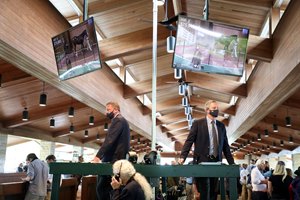Keeneland September Sale Begins on Solid Note


The Keeneland September Yearling Sale began on a solid note Sept. 13, with fervent demand for the individuals deemed to have the best chance of future racing success, topped by a $1.25 million daughter of Tapit .
From 224 cataloged on Day 1, Keeneland reported 109 yearlings averaged $373,211 on total receipts of $40.68 million, with a median price of $330,000. The 62 horses that went unsold represented an RNA rate of 36.3%.
Last year's Book 1 consisted of three sessions versus two this year, so direct session-to-session comparisons are not an accurate reflection of the market.
During Day 1 in 2019, from 190 head cataloged, there were 121 horses sold for an aggregate $50,731,000, an average price of $419,294, and a $325,000 median. The RNA rate was 19.9%.
This year there were five seven-figure transactions during the opener—four fillies and one colt—compared with seven sold for $1 million or more a year ago.

Considering all the logistics involved with being able to conduct the sale in the current environment, Keeneland officials were pleased with the first day. The sales company earlier this year had incorporated internet bidding and enhanced phone bidding into the live bidding process.
"We were so happy to have an opening day of the September yearling sale," said Shannon Arvin, Keeneland president-elect and interim chief of sales. "It was great to have people on the grounds, it was great to have trade, and it was great to see people following protocols so we continue to have trade. It was a good day overall."
With stringent COVID-19 protocols in place, including sale grounds laid out with social distancing paramount and masks required of sale participants, buyers and sellers went about their tasks in a business-like manner. One of Keeneland's changes as a result of the pandemic was a new bidding area located in the rear outdoor show ring that proved to be a popular location for many buyers.
Geoffrey Russell, the director of sales operations, said the measures Keeneland took seemed to work well.
"Having the back walking ring and telephone and internet bidding, we were concerned it would slow down the whole sale, it didn't seem to have any delay," Russell said. "We sold five horses (on the internet); the first was domestic and the rest were international. Having it spread out in three different locations on-site took away a little bit of the atmosphere, but it's COVID-19 and we'll take what we can get."
"We spent a lot of time practicing and preparing for (internet bidding), so it's really great that it worked out as hoped and (we) expected it would," Arvin said.
Russell said it was gratifying to have a vibrant marketplace to open the sale.
"To have competitive bidding at all levels of the market was very rewarding," Russell said. "I think the quality of the horses we have this year is very, very good. There were a couple of horses I thought might break loose a little bit more, but we are in a different world. Overall, it was a good cross section of buyers at the top end.
"It's an amazing industry we're in," Russell continued. "The resiliency of this industry is unbelievable. With what everybody has been through, we appreciate the buyers and owners who are here to buy."
Topping the session was Hip 149, a Tapit filly bought by Claiborne Farm on behalf of one of its clients.
Consigned by Bluewater Sales, agent, the filly was bred in Kentucky by China Horse Club International and is out of Alabama Stakes (G1) winner Embellish the Lace.
Mark Taylor, whose family's Taylor Made Sales Agency was the day's leading consignor with 22 yearlings sold for $7.26 million, said there were not many surprises.
"It's been pretty much what I expected," Taylor said. "There has been really good action on a bunch of horses. The horses that had (positive) vet work coming in and were nice quality horses sold extremely well. The horses that you knew coming into the sale were cataloged a littler earlier than they needed to be having been basically impossible (to sell). Everything in the middle has been OK, but you've got to be realistic about your reserve."
Buyer Larry Best said he was somewhat surprised by the strength of the market.
"I would say, based on what I've heard and seen today, the market's a little stronger than what I anticipated," Best said. "There's a lot of buyers here paying a lot of money for good horses. So that's a good sign for the industry. I hope it continues."
Todd Quast, adviser to buyer Mandy Pope of Whisper Hill Farm, said the quality horses obviously attracted the greatest attention.
"The good ones are still selling good like always," Quast said. "Everybody is on them. There are soft spots in the middle, but not on the top. The middle is going to be a little softer than usual."

